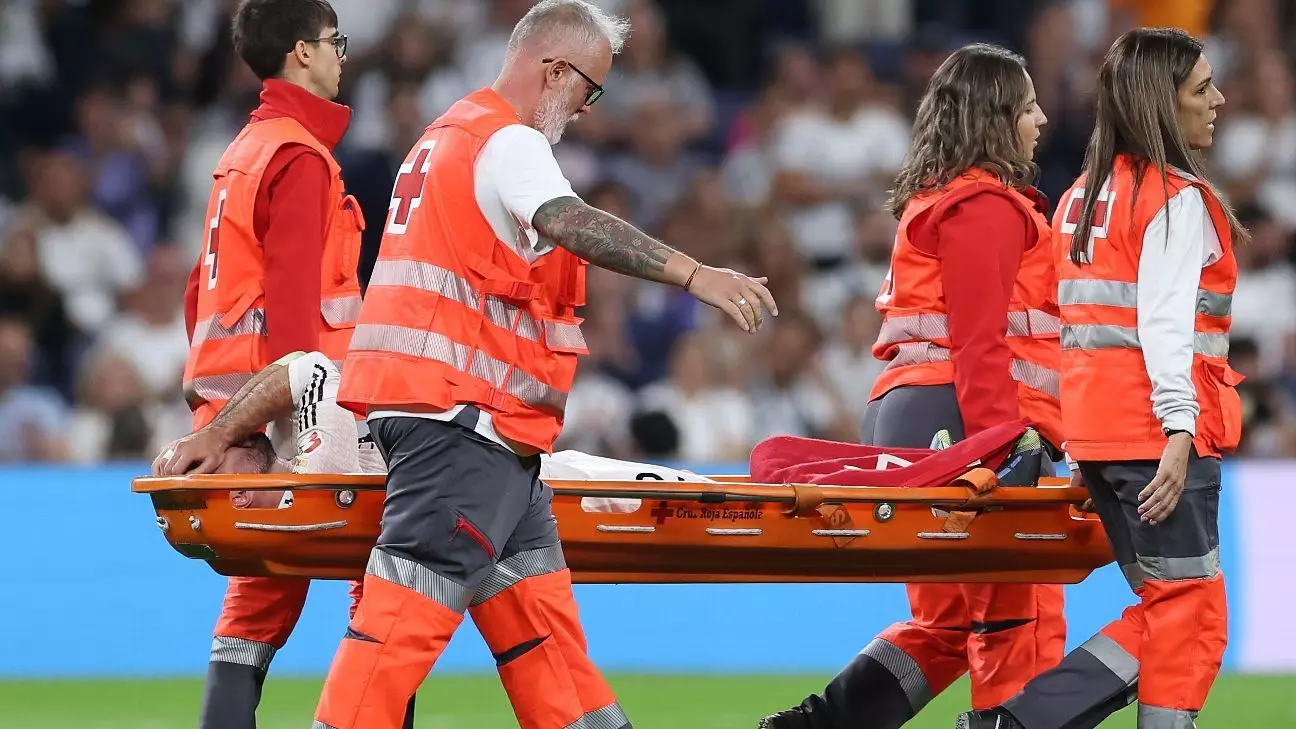In a season where expectations are skyrocketing, the emotional toll on Real Madrid following Dani Carvajal’s apparent knee injury is palpable. As the team celebrated a commendable 2-0 victory over Villarreal in LaLiga, the atmosphere was quickly subdued by the injury that struck down one of their most vital players in added time. Manager Carlo Ancelotti’s candid acknowledgment of the team’s “sad” and “worried” mood paints a vivid picture of the psychological impact injuries can have in professional sports. Carvajal’s collision with Villarreal’s Yeremy Pino left the defender visibly distressed, prompting immediate concerns for what could be a significant setback, not just for him personally but for the squad’s strategic goals.
Dani Carvajal is not merely another player on the pitch; he embodies reliability, experience, and leadership. His key role in the team’s recent triumphs, including the LaLiga and Champions League wins, highlights his importance in the lineup. As a recent nominee for the 2024 Ballon d’Or, his capabilities extend beyond defending; they encompass an understanding of the game that is essential for fostering success. Ancelotti’s remarks underscored this sentiment, emphasizing the vacuum Carvajal’s absence could create. “He’s a fundamental player for us,” said the manager, revealing the depth of the team’s reliance on the right-back’s multifaceted contributions.
The sentiment expressed by Federico Valverde, one of the night’s goal scorers, drives home the crucial reality in sports: player welfare outweighs mere results. Valverde’s remark, “Carva’s health is what matters,” has significant implications for the team dynamics and morale. When a teammate is sidelined, it brings to light the vulnerabilities each player faces, both physically and emotionally. The sports ecosystem requires athletes to be in peak condition, but the constant grind of matches is unforgiving. Further complicating matters, Vinícius Júnior’s shoulder issue adds to the plethora of concerns surrounding player fitness, prompting questions about whether fatigue and injury management are being handled adequately by the coaching staff.
As the club ponders the potential ramifications of Carvajal’s injury, the discussion inevitably shifts to whether they should seek reinforcements in the transfer market. However, Ancelotti remained noncommittal about this possibility, emphasizing the faith he has in Lucas Vázquez as a substitute option. His assertion that “this isn’t the day” for such discussions signals a focus on immediate concerns rather than reactive measures. It raises important questions about the club’s long-term strategy regarding squad depth and player management, especially as they aim to maintain competitiveness in both domestic and international arenas.
As Real Madrid navigates the aftermath of Carvajal’s misfortune, the emotional and physical landscapes of the team reflect broader challenges faced in professional sports. In moments of triumph, the specter of injury reminds players, coaches, and fans alike of the fragility of achievement. While the immediate focus may shift to rehabilitation and recovery, the undercurrents of anticipation, despair, and hope will ultimately define how the team moves forward. The coming weeks will undoubtedly reveal the resilience of both Carvajal and the squad as they confront the uncertainties ahead, striving for excellence amid adversity.

